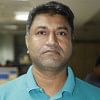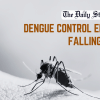Dengue outbreak: Hospitals strained as cases spike

Rajkumar Das stood with his son, Saikat Kumar Das, at Shaheed Suhrawardy Medical College Hospital for over an hour, desperately seeking a bed in the male dengue ward.
Saikat, a tenth grader, had been diagnosed with dengue just that morning.
However, all the beds in the ward were occupied.
"A nurse suggested we try the medicine ward as a bed might be available later," said Rajkumar.
When he approached the medicine ward, a doctor advised them to return on Saturday due to the ongoing bed crisis.
With no other options, Rajkumar left the hospital around 6:00pm, his son still untreated.
This scenario is playing out across many hospitals in Dhaka as a surge in dengue cases overwhelms available resources.
According to a nurse from Suhrawardy's dengue ward, all 57 beds were filled, forcing patients to be redirected to the medicine ward.
The crisis is not limited to Suhrawardy Hospital. Other government hospitals are similarly overwhelmed, struggling to accommodate the sudden influx of dengue patients.
Data from the Directorate General of Health Services reveals that two people have died from dengue, and 299 others were hospitalised in the last 24 hours.
With these new figures, the total death toll has reached 124, and the number of cases has risen to 2,22,65. In the first 20 days of September alone, 9,424 cases were recorded, up from 6,521 in August.
At Suhrawardy Hospital, associate professor HM Nazmul Ahsan reported that all 100 beds in the hospital's two dengue wards were filled by Thursday night, leaving no space for new admissions.
Many patients had to be turned away on Friday due to the shortage.
In response, the hospital has decided to open two additional dengue wards from Saturday.
"We expect the number of patients to rise further in the coming days, and the bed shortage will likely worsen," Nazmul warned.
DGHS data shows that the highest number of dengue patients is currently undergoing treatment at Dhaka Medical College Hospital (118), followed by Mitford Hospital (104), Mugda Hospital (98), and Suhrawardy Hospital (101).
HM Nazmul Ahsan urged all to consult doctors at the first sign of fever and perform a complete blood count test on the third and fourth day, even if the NS1 test comes back negative.
He also warned of dengue's danger signs, including nausea, abdominal pain, and reduced urination, stressing the importance of hydration for those recovering at home.


 For all latest news, follow The Daily Star's Google News channel.
For all latest news, follow The Daily Star's Google News channel. 







Comments